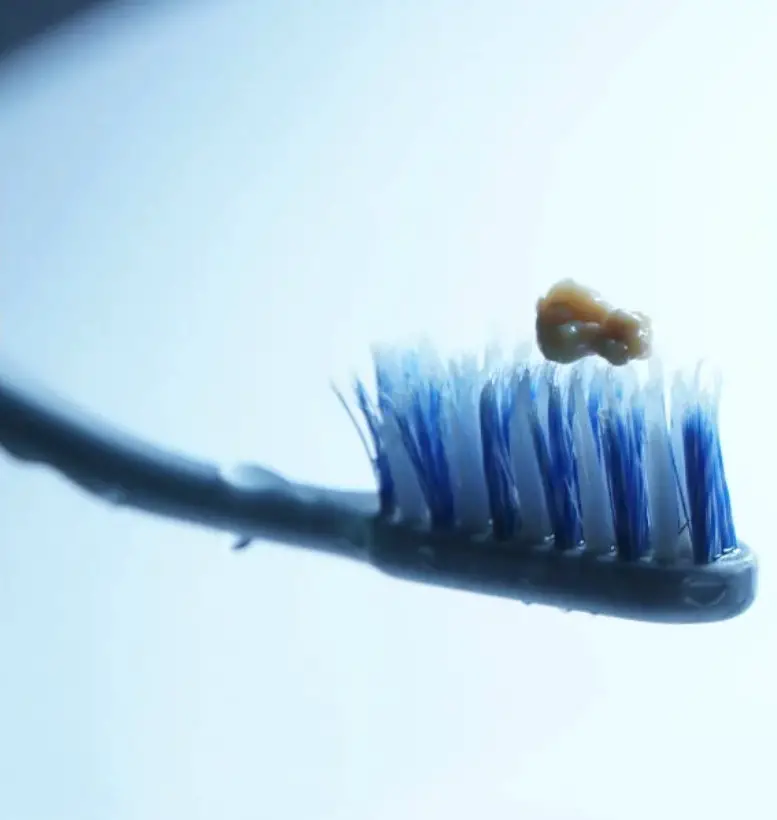If you get tonsil stones, it’s only natural to wonder why they keep appearing deep in your throat. There are several causes of tonsil stones, including food lodged in your throat, bacterial infections, postnasal drip, and more. But what about toothpaste — can it cause tonsil stones too?
Your toothpaste actually doesn’t cause tonsil stones; bacterial infections cause them. Using toothpaste to clean your mouth can fight against and prevent the formation of tonsil stones. However, some of the ingredients in toothpaste (like fluoride) can harden them, making them easier to remove.
So, let’s talk about what actually causes tonsil stones. I’ll discuss the things that can trigger tonsil stones’ growth and go in-depth on the relationship between tonsil stones and toothpaste. I’ll also go over the ways that dental hygiene can prevent tonsil stones in most cases.
What Causes Tonsil Stones?
When it comes to tonsil stones, there’s a lot of misinformation out there on the web. Some people claim that tonsil stones are caused by inadequate oral hygiene, toothpaste, excessive mucus, and more.
We’re sticking to the facts on this one, and I’ll let you know the truth about tonsil stones and how they form.
Did you know that 6% to 10% of people experience tonsil stones? Indeed, it’s a common condition, even for people with excellent dental hygiene and a healthy diet. For some people, tonsil stones appear and reappear, making it difficult for them to find a cure.
of people experience tonsil stones? Indeed, it’s a common condition, even for people with excellent dental hygiene and a healthy diet. For some people, tonsil stones appear and reappear, making it difficult for them to find a cure.
Still, there are several foolproof cures out there, so you should never get your hopes up. So, let’s get down to the details about what causes tonsil stones.
Tonsil stones are actually caused by a bacterial infection in your throat. Tonsils are part of the immune system, and they trap bacteria that you breathe in before they can enter your body. Because they’re the body’s frontline defense against bacteria, they’re prone to infections.
in your throat. Tonsils are part of the immune system, and they trap bacteria that you breathe in before they can enter your body. Because they’re the body’s frontline defense against bacteria, they’re prone to infections.
Tonsils are filters that remove microorganisms from the air, food, and water that you bring into your mouth. As filters, they’re porous — like sponges — and have plenty of caverns, crevices, and folds that trap bacteria, fungi, and other toxins before they can work their way into your lungs.
that remove microorganisms from the air, food, and water that you bring into your mouth. As filters, they’re porous — like sponges — and have plenty of caverns, crevices, and folds that trap bacteria, fungi, and other toxins before they can work their way into your lungs.
With all of these toxin-trapping crevices, tonsils are the ideal place for bacteria to colonize and spread infections. That’s why many people have their tonsils removed as children.
When bacteria colonize on your tonsils, your body triggers an immune response. Immediately, your immune system reacts by sending white blood cells to the site of infection.
response. Immediately, your immune system reacts by sending white blood cells to the site of infection.
These white blood cells fight the bacteria that live in your tonsils, and they die in battle. As they die, the cells stay in your tonsils, forming hard, white or yellow clumps. These clumps are tonsil stones, and they’re precisely like pimples but in your throat.
And they smell like death.
How Does Toothpaste React With Tonsil Stones?
So, what about toothpaste?
Many toothpaste’s contains fluoride , which is supposed to make your teeth stronger and more resistant to acid. When you have tonsil stones, the fluoride in your toothpaste can harden the surface of your tonsil stones and make them more resistant to acid.
, which is supposed to make your teeth stronger and more resistant to acid. When you have tonsil stones, the fluoride in your toothpaste can harden the surface of your tonsil stones and make them more resistant to acid.
Thus, if you’re using fluoride toothpaste, you might only be hardening the stones. That can be both a pro and a con since it’s easier to remove hard tonsil stones, but they’re much more uncomfortable.
Since fluoride can also make your tonsil stones more acid-resistant, they can become harder to dissolve with common treatment agents, such as vinegar, hydrogen peroxide, and lemon juice (as described in my article here). So, essentially, toothpaste can harden tonsil stones, but it never causes them in the first place.
Still, if you have a hard tonsil stone, it’s easier to remove with a cotton swab or tonsil stone removal tool (Amazon). One standard method of removing tonsil stones is putting pressure on your tonsils with a cotton swab around the stone.
(Amazon). One standard method of removing tonsil stones is putting pressure on your tonsils with a cotton swab around the stone.
That’ll squeeze the stone and pop it like a pimple, removing the abscess from your skin. It’s far easier to remove hardened tonsil stones this way since softer tonsil stones will “flow” if you press on them.
Essentially, toothpaste can make your tonsil stones harder. That can make it easier to remove them with a cotton swab, but it can also make the stone more uncomfortable and more challenging to remove with gargles and water flossers.
Because of this, I actually recommend using a prebiotic based toothpaste (Amazon) to help kill off the bad bacteria and make tonsil stones easier to remove with water flossing and gargling. More on toothpastes for tonsil stones here.
(Amazon) to help kill off the bad bacteria and make tonsil stones easier to remove with water flossing and gargling. More on toothpastes for tonsil stones here.
What Does Dental Hygiene Have To Do With Tonsil Stones?
When you brush your teeth, gargle, and floss, you remove bacteria, sugar, and plaque from your mouth. Since bacteria cause tonsil stones, removing them from your mouth is a great way to prevent them from forming.
That’s because, sometimes, when bits of food get lodged in your mouth, they slowly decay, creating an environment where anaerobic bacteria can grow. These bacteria cause tonsil stones, so cleaning your mouth frequently can prevent them.
get lodged in your mouth, they slowly decay, creating an environment where anaerobic bacteria can grow. These bacteria cause tonsil stones, so cleaning your mouth frequently can prevent them.
Still, sometimes, tonsil stones can form without any food lodged in the tonsils.
If you have a bacterial infection in your throat that is resistant to treatment, or if you have an excessive amount of mucus in your throat at any given time, bacteria can easily lodge itself in your tonsils, where you rarely brush or clean.
So, while keeping your mouth clean can remove bacteria, food, and sugar that might contribute to tonsil stones’ growth, if there are stubborn bacteria in your throat, you can still get a tonsil stone, no matter how well you brush your teeth.
Oral Hygiene Tips To Eliminate Your Tonsil Stones
If you have tonsil stones, you may wonder how you can prevent them at home. Most tonsil stones are entirely curable from the comfort of your bathroom. Check out my article on preventative maintenance for more info.
Most of the ways that you can get rid of your tonsil stones involve finding ways to clear your throat of the bacteria that have lodged themselves in the crevices of your tonsils.
If you want to prevent and remove your tonsil stones at home:
- Use an antibacterial oxygenated toothpaste. Oxygenated toothpaste
 usually contains hydrogen peroxide. Peroxide can kill bacteria, dissolve mucus, and add oxygen to your mouth. The oxygen produced will kill the anaerobic bacteria that cause tonsil stones, so using this toothpaste works wonders for softening tonsil stones and eliminating bad breath.
usually contains hydrogen peroxide. Peroxide can kill bacteria, dissolve mucus, and add oxygen to your mouth. The oxygen produced will kill the anaerobic bacteria that cause tonsil stones, so using this toothpaste works wonders for softening tonsil stones and eliminating bad breath. - Brush your teeth twice a day. Brushing your teeth every morning after breakfast and every night before bed can remove bacteria and the sugars that feed them. Establishing a regular brushing habit can help you prevent tonsil stones and kill off the bacteria lodged in your tonsils.
- Use a water flosser. Low PSI
 Water flossers
Water flossers are excellent at flushing out bacteria and dislodging tonsil stones, and they are one of the best tools for removing tonsil stones at home. Use water flossers on the lowest setting and rinse your tonsillar area every time you eat to remove and prevent tonsil stones.
are excellent at flushing out bacteria and dislodging tonsil stones, and they are one of the best tools for removing tonsil stones at home. Use water flossers on the lowest setting and rinse your tonsillar area every time you eat to remove and prevent tonsil stones. - Gargle with hydrogen peroxide or saltwater solution. Acidic, antibacterial solutions of water and salt or hydrogen peroxide do wonders for tonsil stones. They can loosen and break down tonsil stones, kill bacteria, freshen breath, dissolve mucus, and dislodge any debris in your throat. I also have a tonsil stone melting recipe you should check out.
- Drink more water than usual. Drinking water
 after meals can flush trapped food from your throat and clear up any deposits of mucus hiding behind your tonsils.
after meals can flush trapped food from your throat and clear up any deposits of mucus hiding behind your tonsils.
Using these practices, you should see your tonsil stones clear up, and if you keep up with them, even when you do not have tonsil stones, you should be able to prevent them altogether.
Keeping your mouth inhospitable to the bacteria that cause tonsil infections is the key to avoiding them. So the more often you brush, gargle, and drink water, the less likely it’ll be that you’ll get tonsil stones again.
Conclusion
Contrary to some popular myths, toothpaste does not cause tonsil stones, although it can harden them. Brushing your teeth and practicing an intensive oral hygiene routine can remove and kill the bacteria that cause tonsil stones, so the more you brush, the less likely you are to get them again.
Check out the rest of my blog for everything you’ll ever want to know about tonsil stones.


